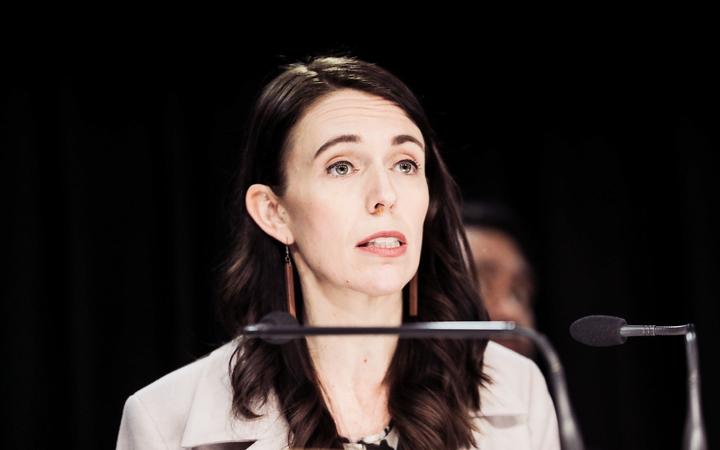As the Taliban says it will soon declare the Islamic Emirate of Afghanistan after seizing control of the country, we discuss their history with award-winning journalist Ahmed Rashid, author of several books, including Taliban: Militant Islam, Oil and Fundamentalism in Central Asia. “These militants have become very well integrated into Afghan society and into Taliban society,” Rashid notes, and if the U.S. wants to capture them, “it’s going to be extremely difficult.” Rashid also looks at the Taliban’s relationship with China, history of human rights abuses against women and whether they will be allowed to continue their education.
AMY GOODMAN: This is Democracy Now!, democracynow.org, The War and Peace Report. I’m Amy Goodman, as we continue to look at the Taliban seizing control of Afghanistan as thousands of Afghans and foreign nationals are trying to flee Afghanistan from the international airport in Kabul. Earlier today, the Taliban released a video from Mullah Baradar Akhund, one of the founders of the Taliban.
MULLAH ABDUL GHANI BARADAR: [translated] We congratulate the great victory to the whole Afghan nation, especially to the people of Kabul and to our mujahideens. The way we have come through was unexpected, as we have reached a position which was never expected. But with the help of Allah, that he has given us the victory, and there is nothing like this in the history of the world. So we should thank Allah. We should have no arrogance. Now is a time to trial. We will give services to our nation. We give serenity to the whole nation, that will go as far as possible for the betterment of their lives.
AMY GOODMAN: Still with us is the award-winning journalist Ahmed Rashid, author of several books, including Taliban: Militant Islam, Oil and Fundamentalism in Central Asia. He’s speaking to us from Madrid, Spain.
Ahmed Rashid, can you comment on what he has said, and also the fact that Kabul fell with, really, hardly a shot being fired? And there’s clearly a coordination between the Taliban and the U.S. right now at the airport, the Taliban letting the U.S. control that, while it has now moved into the palace because President Ashraf Ghani has fled the country.
AHMED RASHID: Well, the Taliban has been saying for several days now that people have nothing to fear in Kabul, and foreigners have nothing to fear, journalists would be protected, so would women. But the problem is that nobody believed them, which is why we are seeing these horrendous scenes at the airport, people trying to get out. And people are very doubtful that they will remain passive and not take revenge, not carry out revenge killings against, for example, soldiers, officers and people who have resisted the Taliban all this time. And the Taliban has to rebuild its credibility, because, remember, just before this takeover, there were months of assassinations taking place in Kabul of top officials, government officials, journalists, women, activists, that the Taliban were going out of their way to eliminate the educated class. And that created real fear and panic in the whole country, not just in Kabul. So, there’s this legacy of brutality, quite recent, which the Taliban has to mitigate in some form or the other.
Now, the next stage is obviously going to be humanitarian relief. I hope there’s going to be some help from donors who are going to bring in food and supplies, because there’s a chronic shortage of food, water, medicines and everything in Kabul right now. And, you know, business has stopped. Kabul was isolated for many days. All of the produce that normally comes into the city has not been coming in. And so, there is an urgent need for humanitarian relief, food. But also there has to be a way to distribute it. Will the Taliban be given the reins of all this food, etc., to distribute it themselves, or will it be an international NGO, the United Nations or somebody else be given it? All these things will have to be negotiated very carefully with the Taliban.
AMY GOODMAN: What have you been, Rashid Ahmed — what have you been, Ahmed Rashid, most shocked by in these last few days? I mean you, who are steeped in history. And then, I started by asking Ali Latifi about that history. But if you can even go back to the founding of the Taliban — we just heard one of the founders of the Taliban — and who exactly they are?
AHMED RASHID: Well, I was one of the first journalists to meet with the Taliban in ’92, the autumn of ’92. And even then, they wanted to be seen as a very pious group who were fed up with the civil war that the elders were fighting with each other, and they wanted an Afghanistan at peace. And they had two claims when they launched themselves. They said, “We will disarm the population,” a highly popular move at that time, “and we will bring peace to Afghanistan.”
And they did, initially, I mean, the first year or so, when they conquered most of the south, again, without firing much of a shot, because people were so fed up with the civil war and the brutalities of the warlords that they easily succumbed to the ideas of the Taliban and supported them. It’s later, when the Taliban went up to Kabul to try to conquer Kabul, they changed their political stance very drastically. Before that, they had been saying, “We do not want power. We will not take power. We will disarm the population, bring peace, and then ask our elders to choose a new government.” Now, that was something quite noble at that time. But once they captured Kabul, they went back to becoming yet another warlord, saying, “We will now rule Afghanistan according to our own principles,” which were a form of a Sunni sect called Deobandism.
Deobandis are very strict followers of the prophet’s life. And they are originated in India and are quite predominant in Pakistan, and that is where a lot of the Taliban learned their religious observance and their very strict adherence to these regulations regarding women, etc. So what we had was a very severe form of Islamic teaching which the Taliban followed, and which none of the rest of the country really had any truck with. They weren’t interested in becoming full Deobandis. The Tajiks, the Uzbeks, the Hazaras and even many of the Pashtuns had no interest in this. And the Taliban imposed this religious cult, if you like, on everybody else. And that was where the real conflict began.
And that is what is really upsetting people today in Afghanistan, because they don’t want to see the return of this kind of strict Deobandi Islam, when they practice an altogether different Islam. And they’ve been through 20 years now of getting education, especially the young, who have seen — who have got jobs, who had an education, who were able to move around the country freely, go abroad, study, get scholarships, come home. All that now, they see, is coming to an end.
AMY GOODMAN: So, these breaking news alerts keep coming in. And a Taliban official says the group will soon declare the Islamic Emirate of Afghanistan. Also, the question of the relationships with China, AFP reporting China is ready to deepen, quote, “friendly and cooperative” relations with Afghanistan, said a government spokesperson after the Taliban seized control of the country. The relationship Afghanistan will have with, for example, China, with Iran? And do you think the Taliban might take a more moderate approach now in the — what they are calling the Islamic Emirate of Afghanistan? And particularly say more about women.
AHMED RASHID: Well, this is — I mean, the whole idea of the Islamic Emirate is what they established after they conquered Kabul in ’96. And it was not accepted by anyone, anyone in Afghanistan and anyone outside of Afghanistan, except for three countries who recognized the government: Pakistan, Saudi Arabia and the United Arab Emirates.
Now, the Taliban are very keen now on getting international recognition. They’ve gone out of their way to travel to neighboring states to win them over. And the most recent visit they had was, in fact, to China, where they met the foreign minister of China, the highest-level official who had ever met with the Taliban. And he asked them to make sure that they did not encourage the Uyghurs, the Muslim Uyghur population, which has been under tremendous repression in China, not to allow the Uyghurs into — not to give them training and not to turn them into guerrillas. And the Taliban, despite their Islamic zeal and their condemnation of non-Muslims and all the rest of it, they have said, “Fine, we’ll do that. We will restrict the activity of Uyghurs in Afghanistan so they do not create any problem for you.” And it was an amazing declaration of the Taliban.
Now, whether it is going to be kept — because, don’t forget, the Uyghurs and many other militant groups from Central Asia, Pakistan, are all very active in Afghanistan. And people don’t see at the moment how the Taliban is going to get rid of them, even if they want to. And these groups include al-Qaeda, of course, much depleted and reduced but still very much a factor in Afghanistan. And a lot of these militants have been fighting alongside the Taliban. So, it’s not that the Taliban can just dump these people or shoot them. Many of them have settled down. They’ve got married in Afghanistan. They’ve got Afghan wives. And these militants are speaking the local languages. So these militants have become very well integrated into Afghan society, into Taliban society.
Now, how the Taliban are going to deal with this is going to be the main preoccupation of the West, I think, and especially the United States, because right now if there are any militant groups around and the U.S. wants to bomb them, kill them, capture them, whatever, it’s going to be extremely difficult, because the closest American forces are much behind in the Gulf, in the Gulf countries, and possibly in Turkey, which is a long way away from Afghanistan.
And the role of women, simply, I think, is also — we have to wait and see. I think they will allow minimal — I mean, what I’ve heard about education, for example, is that women will be allowed to study until grade 12, but they will not be allowed to go to university and other centers of higher learning. Now, that may be true; it may not be true. It may be a declaration that will be made but will not be implemented by some of the militants in the provinces, or it will be implemented in full by Taliban who control the cities and who come into contact with men and women who are well-educated every day. So, it’s touch and go.
And I think the main issue right now is what kind of government are they going to form. Will it include non-Taliban politicians, warlords, tribal elders, etc.? Or is it just going to be an exclusive Taliban government? That’s what they really want, an exclusive Taliban government, no interference from, you know, wannabe politicians. But, of course, that will not be a representative government. And the danger always for the Taliban is going to be watching the ethnic minorities, making sure that they do not rise up in revolt down the road.
AMY GOODMAN: Ahmed Rashid, we’re going to have to leave it there, but we hope to have you back soon, as these developments are fast unfolding. Ahmed Rashid is a writer, award-winning journalist, author of several books, including Taliban: Militant Islam, Oil and Fundamentalism in Central Asia. And also, thanks so much to Ali Latifi, journalist, joining us from Kabul. Of course, we’ll continue to cover this tomorrow and in the days to come.
Coming up, we go to Haiti, where the death toll has reached 1,300 people, following the 7.2 magnitude earthquake. Stay with us.

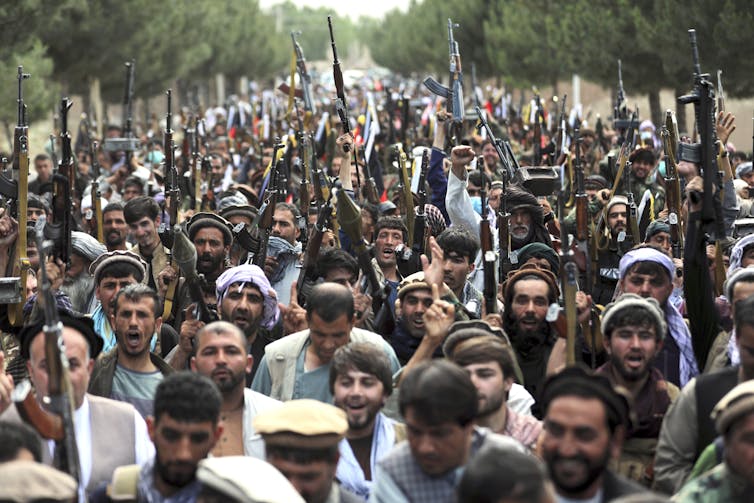
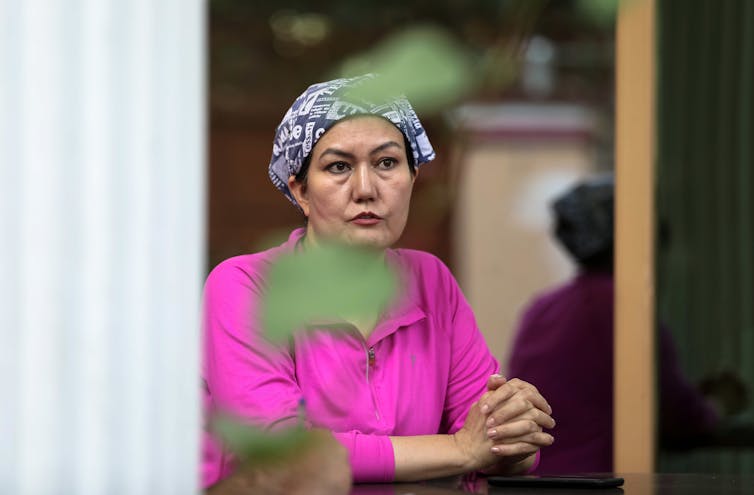

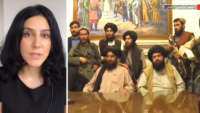

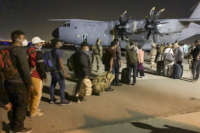



 (@RefugeeAction)
(@RefugeeAction) 





 (@ShaykShack)
(@ShaykShack) 